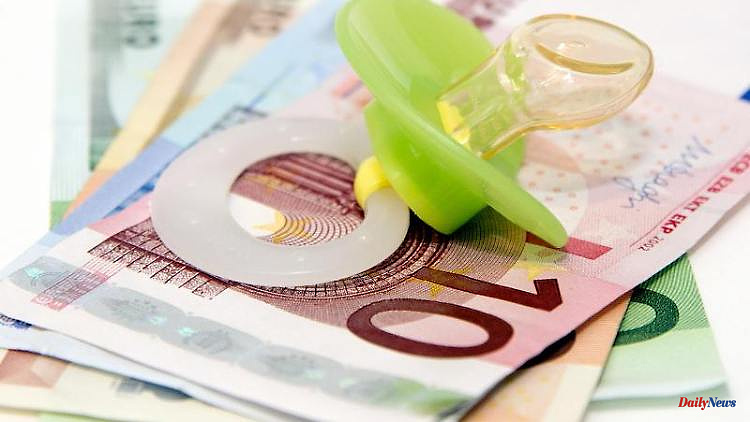Parental allowance is often also available for the self-employed after the birth of a child. But this state support is not always attractive for them. Why?
Moderators, craftswomen or brokers: Anyone who works independently and becomes pregnant must expect a lot of organizational effort even before the birth. The self-employed are also entitled to parental leave and parental allowance. What seems positive at first glance can, however, be associated with hurdles in practice.
One thing is certain: self-employed people who become mothers must ensure that the business they run continues to run. And that is when they fail, at least temporarily, shortly before or after the birth. "The most important thing is careful planning," says Evelyne de Gruyter from the Association of German Women Entrepreneurs (VdU).
It is best for self-employed women to start looking for a replacement as soon as they know they are having a child. It is then necessary to introduce the representative step by step to their task. "You have to be able to delegate and possibly accept other ways of working," says de Gruyter.
Also important: "Inform clients, customers or clients in good time about the pregnancy and point out that you will not be in charge of the business for a while, but that there is a replacement," says de Gruyter.
Pregnant women should also make arrangements with their partner as early as possible as to who will take care of their child and when. "A self-employed woman does not have to apply for parental leave, after all she is her own boss," explains de Gruyter. She alone decides whether and for how long she takes parental leave.
It gets more complicated when it comes to finances. The self-employed can also apply for parental allowance as a state benefit. According to the Federal Ministry for Family Affairs, this is only possible on the day the child is born - at the parental allowance office.
The self-employed who look after and raise their children themselves after birth are entitled to parental allowance. They must be domiciled in Germany or at least habitually reside in this country.
In order to receive parental allowance, the self-employed do not necessarily have to stop working completely. "However, you may not work more than 30 hours a week as long as you receive parental allowance," says the Federal Ministry for Family Affairs.
According to the ministry, there are three variants of parental allowance: basic parental allowance, parental allowance plus and partnership bonus. Basic parental allowance is available for up to twelve months of the child's life. If the partner also wants to take time off to look after the child, the mother and her partner are entitled to a total of 14 months.
With ElterngeldPlus, the self-employed may work a maximum of 30 hours a week. You will then receive parental allowance depending on the level of income. Parental Allowance Plus is granted for twice the period. This means that the self-employed can convert one month of basic parental allowance into two months of parental allowance plus.
The bottom line is that up to 14 months of basic parental allowance become up to 28 months of parental allowance plus. This means that the actual amount is spread over two months. If you receive parental allowance plus for 28 months, 50 percent of the basic parental allowance is paid per month.
Parental allowance plus is four months longer if the self-employed shares childcare with her partner and both work part-time at the same time. In return, both are not allowed to work more than a maximum of 30 hours a week for four months at the same time - that is the partnership bonus model.
According to the ministry, parental allowance is a maximum of 1,800 euros per month. Those who earn 1240 euros or more get 65 percent of the income. Anyone who earns between 1200 and 1239 euros receives 66 percent - and with an income between 1000 and 1199 euros there is 67 percent.
The assessment basis for parental allowance is the net income. For the self-employed, this is the profit from the last tax assessment period, i.e. usually the last calendar year.
Evelyne de Gruyter is critical of this regulation. "Especially in times of crisis with economic fluctuations, there can be a drop in orders and thus negative income developments, which then have a negative impact on the amount of parental allowance," says de Gruyter.
The parental allowance for the self-employed has other downsides: Anyone who works a maximum of 30 hours a week during parental leave must offset the profit against the parental allowance.
Income that was generated before parental allowance was received and is only paid after the birth is credited to the parental allowance as additional income. "So that means that you may have to repay part of the parental allowance you received," says de Gruyter.
Not to forget: The self-employed continue to have high fixed costs while receiving parental allowance. For example health insurance, ongoing operating costs or professional insurance. The self-employed have to make such expenses in full despite reduced working hours.
"These fixed costs are by no means covered by the social security lump sums that are used to calculate parental benefits," says de Gruyter. Whether the parental allowance model is actually attractive for the self-employed depends heavily on the circumstances of the individual case.












